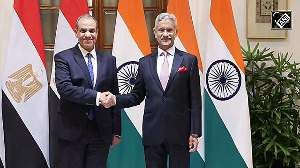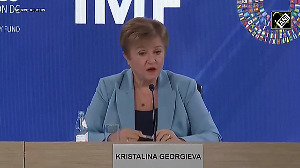The claim made by Australian Federal Police in a court affidavit on terror suspect Mohammed Haneef appears to be inconsistent with the official police record of interview with him, media reports said.
The police affidavit, which is before the courts, and the 142-page record of Haneef's first police interview, showed there were major discrepancies on two significant issues, the reports said.
The affidavit states that Haneef told police in his first interview that he lived in Britain with two terrorism suspects, his second cousins, both of whom have been charged by Britain police over the foiled bombings in London and Glasgow.
Information in the affidavit, which became part of the formal record for the Brisbane Magistrates Court in Haneef's successful bail application, was considered by Immigration
Minister Kevin Andrews, but Andrews did not have access to the police record of interview, The Australian reported.
A few hours after Haneef was granted bail on Monday, Andrews cancelled his visa and ordered his continuing detention.
According to the police affidavit, 'On July 2 and 3, 2007 Haneef participated in a taped record of interview with the AFP and stated -- Whilst in the UK he resided with suspects 1 and 2 (alleged suicide bomber Kafeel Ahmed and his brother Sabeel Ahmed) at 13 Bentley Road in Liverpool.'
However, in the record of interview, obtained by the newspaper, Haneef told police that he lived at 13 Bentley Road, Liverpool, with several doctors, whom he names. None were the two suspects.
Haneef told police he visited Cambridge on two occasions in 2004 and stayed for up to six days with Kafeel Ahmed. Haneef also stated that he had moved out of 13 Bentley Road when Sabeel Ahmed subsequently stayed there.
'I don't know exactly how long he lived there, because I wasn't staying there then,' Haneef said.
In subsequent Immigration Department documents used to advise Andrews, senior public servant Peter White asserted that Haneef advised the AFP that he resided with Sabeel Ahmed at a boarding house located at 13 Bentley Road, Liverpool, UK.'
The police affidavit asserted that Haneef, 27, a Gold Coast Hospital registrar since September last year, 'had no explanation as to why he did not have a return ticket' from India to Australia.
Haneef, whose wife, Firdous Arshiya, gave birth to their first child by emergency caesarean section on June 26 in India, was trying to leave Australia on July 2 on a one-way ticket bought the same day by his father-in-law in India.
While the police affidavit stated Haneef 'had no explanation' about his one-way ticket, the record of interview showed that he gave a detailed explanation to police while answering questions.
Haneef told police that as he did not have funds in his Australian bank account his father-in-law had booked and paid for the one-way ticket with an understanding that 'when I go there we can arrange for the coming back ticket. Because I just got 7 days' leave approved.'
AFP Commissioner Mick Keelty, who has condemned the leaking of the record of interview to The Australian and has defended the charge on Haneef with the criminal offence of 'supporting a terrorist organisation' for giving his mobile phone SIM card a year ago to Sabeel Ahmed, was unavailable to comment on the affidavit.
Keelty's spokeswoman, Kate Bradstreet said late on Thursday night: 'These are all matters that will be heard in a court of law. It is a matter that has to come out in court. I'm not in a position to confirm whether this material was sent to the Minister (for Immigration).'
However, the affidavit raises further questions about the handling of Haneef's case and the accuracy of other analysis by the AFP of the evidence in this case.
Haneef's links with his second cousins were cited by police as a key factor in their case, and a commonwealth prosecutor told magistrate Jacqui Payne: 'Haneef lived with these people. He may have worked with these people. He is associated with these people. He is their second cousin.'
Meanwhile, professor William Maley, of the Australian National University, said vital questions over the material that Andrews had relied on had become more relevant since
Commissioner Keelty confirmed 'no government minister would have had access to a record of interview.'
'First, if the minister did not have the whole transcript, by what process was material selected from the interview for presentation to him,' Professor Maley asked.
'Second, if the minister acted only on the basis of a compilation of selections from the interview, could it truly be said that he had considered 'all other evidence' available to him,' he probed further.
Haneef's barrister, Stephen Keim SC, was widely backed by leading lawyers on Thursday, amid fierce condemnation of Attorney-General Philip Ruddock.





